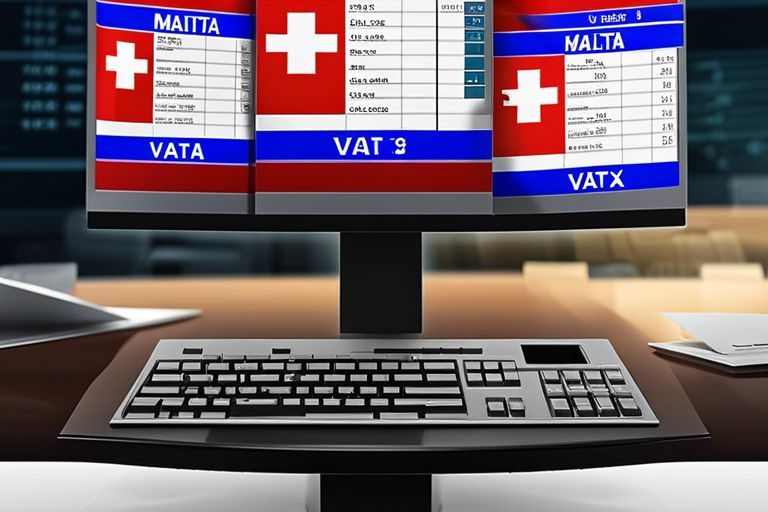VAT Regulations for Maltese Businesses

Anthropogenic activities have resulted in increasingly complex VAT regulations for Maltese businesses. It is crucial for businesses to stay informed and compliant with the EU VAT laws when conducting transactions in Malta. Understanding the VAT registration threshold, the types of VAT rates applicable, and the mandatory VAT filing requirements can help businesses avoid penalties and remain competitive in the market. This blog post will provide an overview of the key VAT regulations for Maltese businesses and offer insights on effectively managing VAT compliance.
Understanding VAT
To operate a successful business in Malta, it is crucial to have a clear understanding of the Value Added Tax (VAT) regulations. VAT is a consumption tax that is levied on the value added to goods and services at each stage of production or distribution. Understanding VAT is essential for all businesses in Malta to ensure compliance with the law and avoid potential penalties.
Definition and Basic Principles
Any business operating in Malta is required to register for VAT if their annual taxable turnover exceeds the prescribed threshold. Once registered, businesses must charge VAT on their goods and services, and in turn, can recover any VAT they have paid on their business expenses. The basic principles of VAT include the concept of input and output tax, where businesses calculate the VAT they owe (output tax) by deducting the VAT they have paid (input tax).
Types of VAT Rates in Malta
Any business in Malta should be aware that there are three main types of VAT rates: standard rate, reduced rate, and zero rate. The standard rate is 18%, while the reduced rate applies to specific goods and services, such as food, at 5%. Zero rate is applied to exports and other international services. It is important to note that certain goods and services are exempt from VAT altogether. Additionally, import VAT is applicable on goods imported from non-EU countries.
- Standard rate – 18%
- Reduced rate – 5%
- Zero rate – 0%
Basic necessities such as food and medicine are subject to the reduced rate of 5%, while certain financial and insurance services are exempt from VAT altogether. Importantly, the information should be broken down into a table with 2 columns and 5 rows to provide a clear overview of the different VAT rates and their respective categories.
VAT Registration
Assuming your business in Malta meets the criteria for VAT registration, it is important to understand the process and documentation (6 posts)" class="autobesttag" style="color:#77da55" rel="nofollow" href="https://malta-media.com/tag/documentation/">documentation required in order to comply with the VAT regulations.
Criteria for VAT Registration
For Maltese businesses, mandatory VAT registration is required when the annual taxable turnover exceeds €35,000. Additionally, voluntary registration can be pursued if the turnover is below this threshold. Businesses that are involved in importing and exporting goods are also required to register for VAT, regardless of their turnover.
Process and Documentation
The registration process involves submitting an application form to the VAT Department along with supporting documentation such as a copy of the company’s memorandum and articles of association, a bank statement, and details of the company’s activities. Once the application is approved, a VAT number will be issued to the business.
For instance, businesses are also required to maintain accurate and timely records of all transactions in order to comply with VAT regulations. This includes keeping a record of all sales and purchases, as well as VAT invoices for a minimum of 6 years.
VAT Compliance and Reporting
After registering for VAT, Maltese businesses are required to adhere to specific compliance and reporting regulations to ensure they meet their tax obligations. This includes maintaining accurate records, filing VAT returns, and making timely payments to the tax authorities.
Record Keeping and Invoicing Requirements
On the record-keeping front, Maltese businesses must maintain detailed records of all their transactions, including sales, purchases, expenses, and VAT invoices. These records must be kept for a minimum of 6 years and be readily available for inspection by the VAT department. Additionally, businesses are required to issue VAT invoices for all taxable supplies made, including specific information such as the supplier’s details, invoice number, date of supply, and the amount of VAT charged.
Filing VAT Returns and Payments
Payments of VAT must be made to the tax authorities on a quarterly basis, with the deadlines falling on the 15th day of the month following the end of the VAT return period. VAT returns must also be filed quarterly, providing a summary of all VAT transactions during the period. Additionally, businesses may be required to submit EC Sales Lists or Intrastat declarations if engaged in cross-border trade within the EU. Failure to comply with these requirements can result in penalties, fines, and liabilities for the business.
VAT Exemptions and Refunds
Keep abreast of the VAT regulations for Maltese businesses, particularly when it comes to exemptions and refunds. Understanding the criteria for these provisions will help you avoid penalties and ensure compliance with the law.
Categories of Exempt Supplies
Refunds may be available for certain supplies that are exempt from VAT. These supplies include healthcare, education, and financial services. It’s crucial to be aware of these categories to determine your eligibility for a VAT refund and avoid any unnecessary expenses.
Purchasing goods or services related to these exempt supplies can also affect your input tax recovery, as these will not be eligible for a refund. Therefore, it’s important to keep meticulous records and differentiate between exempt and taxable supplies.
Applying for VAT Refunds
Refunds are available for business expenses that are incurred in other EU member states. The process for applying for a VAT refund from another EU member state involves submitting the necessary documentation to the Maltese VAT Department. It’s essential to comply with the specific requirements and timelines for submitting these refund claims to avoid any delays or rejections.
A reputable tax consultant can provide guidance on applying for VAT refunds and help ensure that you meet all the necessary criteria. Seeking professional assistance can streamline the process and alleviate any potential complications that may arise during the application process.
FAQs:
What is VAT, and why is it crucial for businesses in Malta?
VAT, or Value Added Tax, is a consumption tax levied on goods and services. Understanding VAT is crucial for businesses in Malta to ensure compliance with the law and avoid potential penalties.
What are the different types of VAT rates applicable in Malta?
Malta has three main VAT rates – standard rate (18%), reduced rate (5%), and zero rate (0%). Basic necessities like food are subject to the reduced rate, while exports are zero-rated.
When is VAT registration mandatory for Maltese businesses, and what is the process?
Mandatory VAT registration in Malta occurs when the annual taxable turnover exceeds €35,000. The process involves submitting an application form with supporting documents to the VAT Department.
What are the record-keeping requirements for businesses after VAT registration?
Maltese businesses must maintain detailed records of transactions, including sales, purchases, expenses, and VAT invoices. These records must be kept for a minimum of 6 years.
How often do businesses in Malta need to file VAT returns and make payments?
VAT returns and payments in Malta are required on a quarterly basis, with deadlines falling on the 15th day of the month following the end of the VAT return period.
Recommended Posts

Malta’s Financial Regulations for Business
July 24, 2024

Financial Planning and Tax Strategies in Malta
July 22, 2024

Online Casino Regulations in Scandinavia
July 18, 2024




